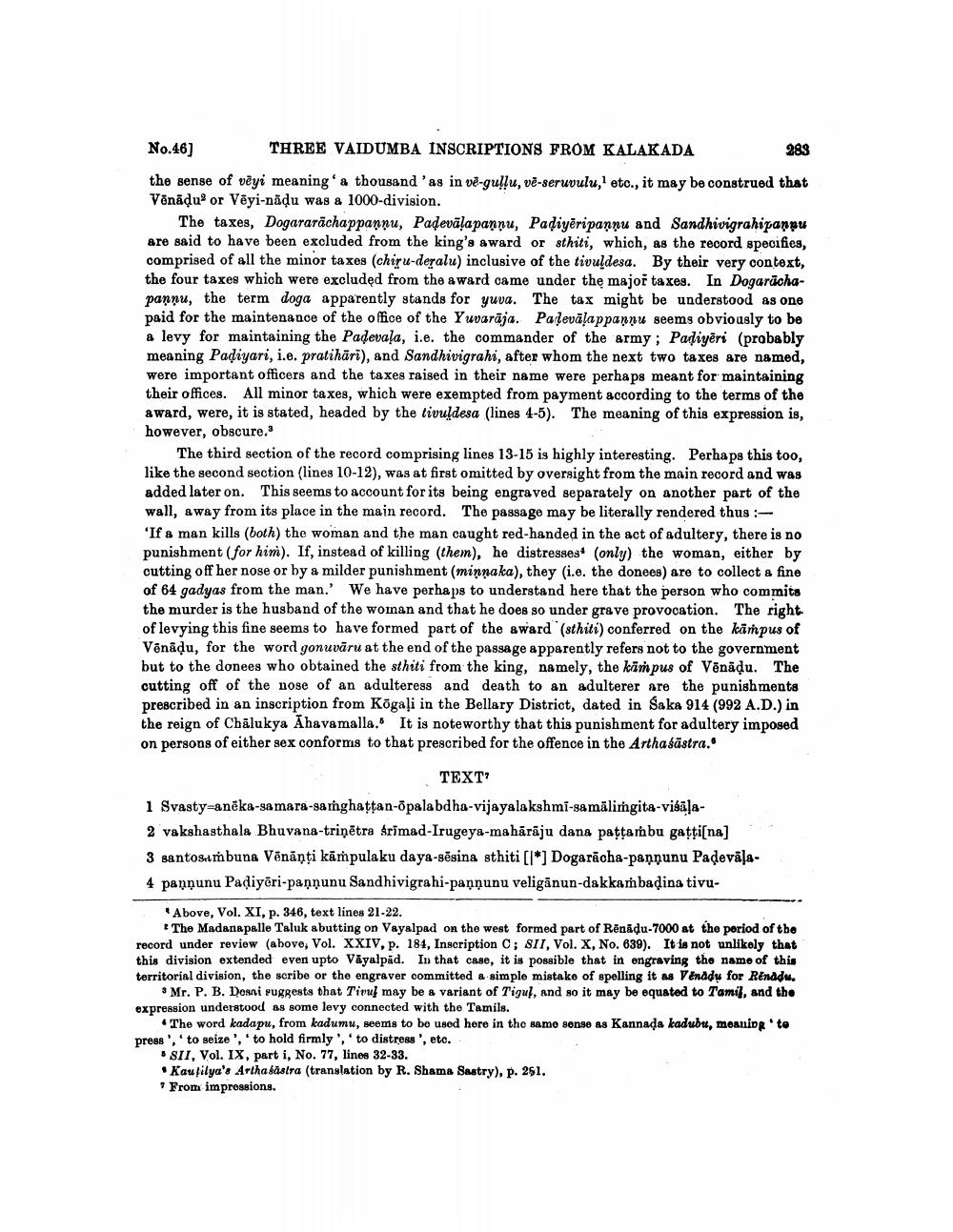________________
No.46] THREE VAIDUMBA INSCRIPTIONS FROM KALAKADA
283 the sense of vêyi meaning' a thousand 'as in vē-gullu, vē-seruvulu,' etc., it may be construed that Vēnādu or Vēyi-nādu was a 1000-division.
The taxes, Dogararāchappannu, Padevālapannu, Padiyēripannu and Sandhivigrahipanpu are said to have been excluded from the king's award or sthiti, which, as the record specifies, comprised of all the minor taxes (chiru-deralu) inclusive of the tivuldesa. By their very context, the four taxes which were excluded from the award came under the major taxes. In Dogarāchapannu, the term doga apparently stands for yuva. The tax might be understood as one paid for the maintenance of the office of the Yuvarāja. Pa levālappannu seems obviously to be a levy for maintaining the Padevala, i.e. the commander of the army; Padiyēri (probably meaning Padiyari, i.e. pratihāri), and Sandhivigrahi, after whom the next two taxes are named, were important officers and the taxes raised in their name were perhaps meant for maintaining their offices. All minor taxes, which were exempted from payment according to the terms of the award, were, it is stated, headed by the tivuldesa (lines 4-5). The meaning of this expression is, however, obscure.'
The third section of the record comprising lines 13-15 is highly interesting. Perhaps this too, like the second section (lines 10-12), was at first omitted by oversight from the main record and was added later on. This seems to account for its being engraved separately on another part of the wall, away from its place in the main record. The passage may be literally rendered thus : 'If a man kills (both) the woman and the man caught red-handed in the act of adultery, there is no punishment (for him). If, instead of killing (them), he distressest (only) the woman, either by cutting off her nose or by a milder punishment (minnaka), they (i.e. the donees) are to collect a fine of 64 gadyas from the man.' We have perhaps to understand here that the person who commits the murder is the husband of the woman and that he does so under grave provocation. The right of levying this fine seems to have formed part of the award (sthiti) conferred on the kāmpus of Vēnādu, for the word gonuvāru at the end of the passage apparently refers not to the government but to the donees who obtained the sthiti from the king, namely, the kampus of Vēnādu. The cutting off of the nose of an adulteress and death to an adulterer are the punishments prescribed in an inscription from Kögaļi in the Bellary District, dated in Saka 914 (992 A.D.) in the reign of Chalukya Ahava malla. It is noteworthy that this punishment for adultery imposed on persons of either sex conforms to that prescribed for the offence in the Arthaśāstra."
TEXT
1 Svasty-anēka-samara-sarghattan-opalabdha-vijayalakshmi-samālimgita-visāļa2 vakshasthala Bhuvana-triņētra Srimad-Irugeya-mahārāju dana pațţarbu gatti[na] 3 santosumbuna Vēnāņti kāmpulaku daya-sēsina sthiti [l*] Dogarācha-paņņunu Padevāļa4 paņņunu Padiyēri-pannunu Sandhivigrahi-pannunu veligānun-dakkambadina tivu
Above, Vol. XI, p. 346, text lines 21-22.
+ The Madanapalle Taluk abutting on Vayalpad on the west formed part of Renadu-7000 at the poriod of the record under review (above, Vol. XXIV, p. 184, Inscription C; SI1, Vol. X, No. 639). It is not unlikely that this division extended even upto Vāyalpad. In that case, it is possible that in engraving the name of this territorial division, the scribe or the engraver committed a simple mistake of spelling it as Venady for Renddu.
• Mr. P. B. Dosni Puggests that Timul may be & variant of Tigul, and so it may be equated to Tamil, and the expression understood as some levy connected with the Tamils.
• The word kada pu, from kadumu, seems to be used here in the same sense as Kannada kadubu, meaning 'to press ''to seize', 'to hold firmly', 'to distress', etc.
* SII, Vol. IX, part i, No. 77, lines 32-33. • Kaulilya's Artha fatra (translation by R. Shama Sastry), p. 261. From impressions.




